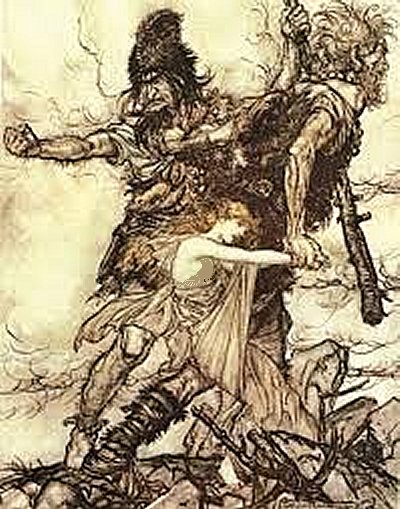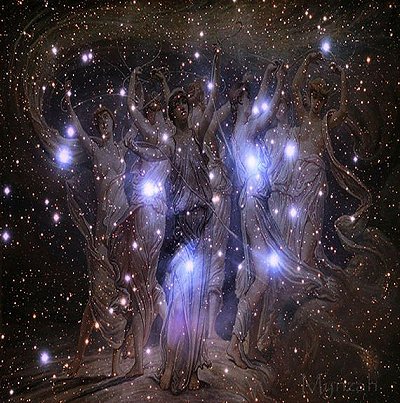 |
SPIRIT
LODGE
LIBRARY
Myth
& Lore
Page
67
|
(Main
Links of the site are right at the bottom of the page)
Some of the 86 pages in this Myth & Lore section are below.
The rest will be found HERE
The Seven Sisters -
Pleiades
By CinnamonMoon
From the Women's Encyclopedia of
Myths and Secrets by Barbara G. Walker.

The Seven Sisters (Pleiades): The
convoluted symbolism of the Pleiades or Seven Sisters suggests
an extremely archaic tradition. The importance attached to this
group of dim stars seems out of proportion to their apparent
insignificance.
The sacrifice of the Mexican savior
Xipe Totec, Our Lord the Flayed One, took place on the Hill
of the Stars at the moment when the Pleiades reached the zenith
on the last night of the Great Year cycle. It was thought if
the Sisters were not propitiated by the sacrifice, the universe
would fall to pieces and the world would come to an end.
Pre-Vedic India also attached sacrificial
significance to the Pleiades, called Seven Mothers of the World,
or Krittikas, "razors" or "cutters." They
were also seven priestesses who "judged" men--a cognate
was Greek 'kritikos', "judge"--and sometimes "critically"
wounded them, for their razors were castrating moon-sickles.
The fire god Agni copulated with the Seven Mothers while they
were menstruating, the usual Tantric rite later outlawed by
the Vedic priesthood. They gave birth to a solar hero enveloped
in a great red cloud (female symbol) penetrated by bolts of
lightning (male symbol). The hero was sacrificially slain, wounded
in the side with a spear, and from his body sprang his reincarnation,
another hero like himself. In this myth may be discerned rites
of great antiquity, predating the discovery of fatherhood, when
blood was the essence of generation.
The Pleiades were prominent in the
early cult of Aphrodite, who was supposed to have given birth
to them under her name of Pleione. Aphrodite was a castrating
Crone-goddess as well as a Holy Dove; and the Pleiades were
"a flock of doves." They were connected with sacrificial
New Year ceremonies in Greece as in central America and southeastern
Asia. The Seven Sisters stood at the zenith on New Year's Eve
as if to select the god of the new Aeon. Old Babylonian texts
began the new year with the Pleiades. Later, the zodiacal sign
of the New Year became Aries, the Ram.
Egyptian texts allude to the Pleiades'
archaic significance as Krittikas, judges of men, assigning
them to seven planetary spheres as the seven Hathors. The dead
had to speak the names of these Goddesses to pass their "critical"
examinations and enter paradise: "Hail, ye seven beings
who make decrees, who support the Balance on the night of the
judgment of the Utchat, who cut off heads, who hack necks in
pieces, who take possession of hearts by violence and rend the
places where the hearts are fixed, who make slaughterings in
the Lake of Fire, I know you, and I know your names; therefore
know ye me, even as I know your names." The reference to
tearing out hearts is remarkably evocative of Aztec religious
customs. The Seven Mothers Who Make Decrees appear also in Arabia
as Seven Sages or 'imams' (from ima, "mother").
In classical mythology the Pleiades
represented the Maytime feast of life and the November feast
of death at opposite points of the year. They were emanations
of the Moon-goddess "who was worshipped at the two solstices
as the Goddess of alternatively Life-in-Death and Death-in-Life
and who early in November, when the Pleiades set, sent the sacred
king his summons to death." Prayers
for the dead were recited before the Pleiades on November 1,
which became All Soul's Day.
Greeks said the leader of the Pleiades
was the Dove-goddess, Alcyone, the 'halcyon' bird who brought
good weather for the planting season. Another Pleiad was Electra,
mother of Dardanus, legendary founder of Troy, whose name is
still preserved in the Dardanelles. Another Pleiad was Merope,
"Bee-eater," a title of Aphrodite's queen bee as devourer
of the drone. Some said Merope was one of the Furies; others
said she married the doomed sun-hero Sisyphus. Still another
Pleiad was Maia "the Maker" or the "Grandmother,"
mother of Hermes the Enlightened One, as her Hindu counterpart
Maya mothered Buddha the Enlightened One.
Classical writers seemed anxious
to disguise the real nature of the Pleiades. One story insisted
they were all virgins. Orion the Hunter tried to rape them,
but Zeus protected them by turning them into doves and placing
them in the heavens. The story was obviously absurd, as all
the Pleiades had lovers or husbands, and three of them had mated
with Zeus himself. In earlier myths, Orion the Hunter was their
victim, not their attacker. The Huntress of the Seven Stars,
Artemis, shot him to death in the sea, suggesting that victims
were sometimes riddled with arrows then consigned to the deep.
Artemis personified another set of
seven stars, the much larger constellation Ursa Major, the "Great
She-Bear," who may have been another version of the Seven
Sisters. Artemis and Aphrodite both were associated with ancient
cults of the Seven Pillars of Wisdom, seven mantic priestesses
of Seven-Gated Thebes, where the Seven Hathors once ruled, where
sacred kings were slain every seventh year, and where Teiresias
was castrated and lived seven years as a temple woman. The same
magic seven were called Seven Midwives in Egypt and the Orient.
They were probably represented in pre-patriarchal Jerusalem
by the holy Menorah (seven-branched candlestick) symbolizing
the sevenfold Men-horae or Moon-priestesses, as shown by its
female-genital decorations, lilies and almonds (Exodus 25:33).
Medieval superstitions betrayed
fear of groups of seven females, perhaps as a relic of ancient
images of the Sisters. East Frieslanders believed that in any
family of seven sisters, one of the seven was sure to be a vampire
or a werewolf. The sevenfold grouping could also be arranged
in a vertical line of descent, e.g. in ubiquitous belief that
a seventh daughter of a seventh daughter was always a witch.
|
|
|
|
|
|
|
|
|
|
|
|
Libraries
are on this row
|
|
|
INDEX
Page 3
(Main Section, Medicine Wheel, Native Languages &
Nations, Symbology)
|
|
INDEX
Page 5
(Sacred Feminine & Masculine, Stones & Minerals)
|
|
|
|
|
|
|
©
Copyright: Cinnamon Moon & River WildFire Moon (Founders.)
2000-date
All rights reserved.
Site
constructed by Dragonfly
Dezignz 1998-date
|
|